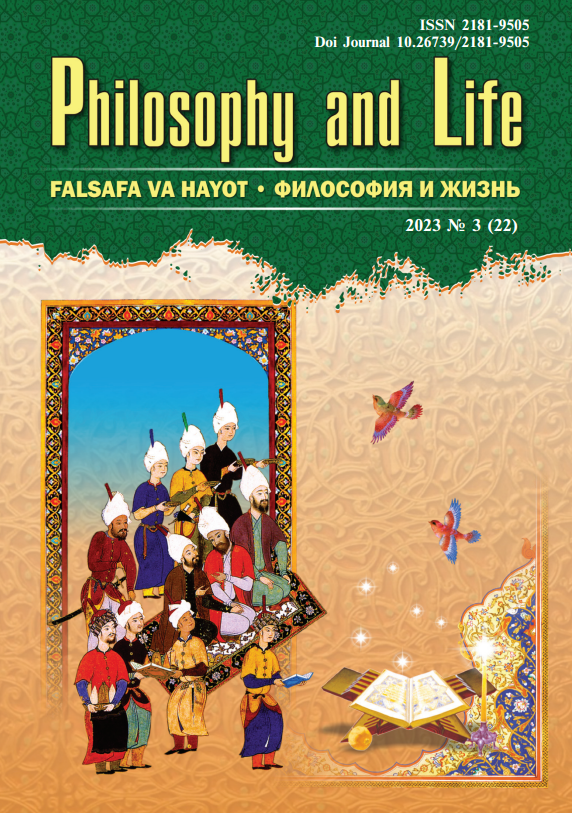FROM CONVENTIONAL PROPOSITIONS OF AVICENNA TO ETEBARIAN THEORY OF TABATABAEI
Keywords:
Conventional propositions, Etebarian, Practical philosophy, Primary premises, TabatabaeiAbstract
Etebarian theory of Tabatabei is one of the most important inventions of Islamic philosophy in the modern age. In this theory, Tabatabaei has dealt with how the concepts of practical intellect are formed and considers basic concepts of practical philosophy. Thus, he does not regard the argument as current in etebarian. In other words, practical philosophy is not a discursive science. Whether Etebarian Theory is rooted in Islamic philosophy or not is something the authors have paid close attention to. In this regard, some scholars believe that Etebarian Theory is influenced by epistemological changes of the new philosophy in Europe, while others consider it an innovation merely. The authors believe that Etebarian Theory is somehow a continuation of Avicenna’s view of practical philosophy arguments as conventional propositions. Unlike Al-Farabi, Avicenna does not associate the mind in practical area with self-evident arguments. As a result, he has brought practical philosophy out of the circle of discursive sciences. So, in this article, the authors closely look at existing documents and works of Al-Farabi, Avicenna, and Tabatabaei and by describing and analyzing them, tries to prove the continuation of Avicenna’s view of practical philosophy arguments as conventional propositions with Etebarian Theory of Tabatabaei.
References
Al-Farabi, A. (1985). Fosul Montaze’ah. ed. Dr. F. Najjar. Al-Maktaba Alzahra.
Al-Farabi, A. (1988). Al-Manteqiat. ed. M. T DaneshPazhouh. School of Ayatollah Al-Marashi al-Najafi.
Alshahrzouri, Sh. (1993). Sharh Hekma al-Eshraq. ed. H. Ziaei Torbatii. Institute for Humanities and Cultural Studies.
Aristotle, (2009). Nicomachean Ethics (NE). ed. David Ross. Oxford university press.
Avicenna,(1908) Tase Rasael fi al-Hekmah va al-Tabi’iat. Dar al-Arab.
Avicenna, (1980) The Treatise of Oyoun al-Hekmah. ed. Ab. Badavi. Dar al-Qalam.
Avicenna, (1984) Al-Shifa’ al-Hayat, ed. S. Zayed. School of Ayatollah Al-Marashi.
Avicenna, (1996) Al-Isharat wa Al-Tanbihat. Al-Balaghe Publication.
Avicenna,(2000) Kitab al-Ta’liqat. 4th ed. Center of Islamic Advertisement Office.
Bozari Nezhad, Y. (2017) Methodology of Practical Wisdom, University of Tehran Publication.
Esfahani, MH. (2008) Nahaye al-Derayeh fi Sharh al-Kefaye, 2nd Ed. Al al-Beit Alaihom al-Salam li Ehya al-Tarath Institution.
Hume, D. (1985) A Treatise of Human Nature. Oxford Clarendon Press.
Lahiji, Ab. (1993) Origin of Faith, ed. S. Amoli Larijani. Al-Zahra.
Motahhari, M. (1984) A Critique on Marxism, Sadra Publications.
Shirazi, S. (2002) Al-Hekmah al-Mota’aliye fi al-Asfar al-Aqliye al’Arba’e. Dar al-Ehya’ al-Tarath al-Arabi.
Ragheb Esfahani. H. (1992), Al-Mofradat fi Gharib al-Quran, Re. S. Davoodi. Dar al-Ilm al-Shamie.
Sabzevari, H. (1990) Sharh al-Manzoumeh. Nashre Nab Publication.
Sabzevari, H. (1993) Sharh al-Asma’ ed. Najaf Qoli Habibi. University of Tehran Publication.
Savi, O. (2004) Al-Basaer al-Nasirie fi Ilm al-Manteq, compiled by Hasan Maraghi. Shamash Tabriz.
Sobhani, J. (1998) Intellectual Goodness and Evilness, compiled by A. Rabbani Golpaigani. Institute for Humanities and Cultural Studies.
Soroush, Ab. (1980) Science and Value, Yaran Publication.
Tabatabaei, MH. (1984) Al-Mizan fi Tafsir al-Quran, trans. M.B Musavi. Islamic Publication Office.
Tabatabaei, MH. (1996) Nahaye al-Hekmah, Institute of Al-Nashr al-Islami.
Tabatabaei, MH. (2008) Principles of Philosophy and Method of Realism, 2nd Ed. Boostane Ketab Publication.
Tusi, N. (1992) Johar Al-Nazid, ed. M. Bidar Far. Bidar Publications.
Tusi, N. (1996) Sharh Al-isharat wa al-tanbihat, Al-Balaghe Publication.

